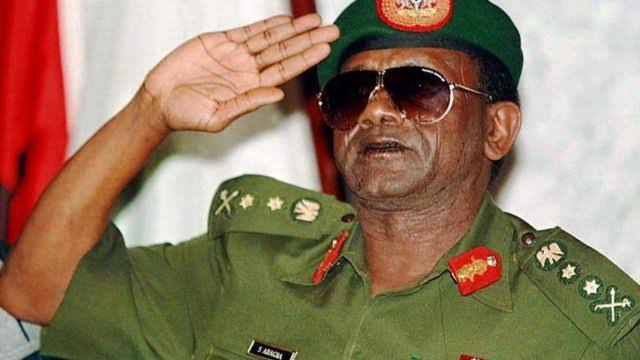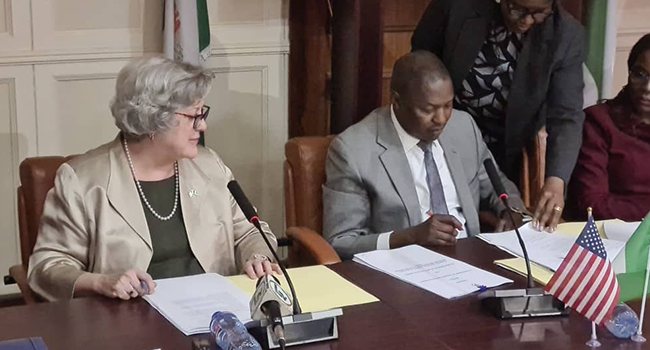Headlines
Abacha loot: Court opens can of worms

BY EMEKA EJERE
Recent judgment ordering disclosure of spending details of about $5 billion Sani Abacha loot by the governments of former presidents Olusegun Obasanjo, Umaru Yar’Adua, Goodluck Jonathan and Muhammadu Buhari, may have left the Federal Government in a quandary.
It has not be the tradition since 1999 for presidents to investigate or probe their predecessors. But the court judgment leaves the government with little options.
The government may choose to obey the court order and go through the rigorous process of gathering the documents that will provide information about the required details; or it may also toe the line of disregarding the order and acquire the infamy of failing the test of rule of law.
Whichever way the government chooses to go, the development is bound to go down in history as another boost to the profile of the Socio-Economic Rights and Accountability Project (SERAP), as civil society organsation with unwavering commitment to holding public office holders accountable in the management and utilization of public funds.
SERAP had approached the court in 2020 to compel the government of the then President Muhammadu Buhari to fully grant its requests of providing details of the spending of the recovered Abacha loot.
The then Federal Government had told SERAP that it had no records of the exact amount of public funds stolen by Abacha and no records of the spending of about $5 billion recovered loot for the period between 1999 and 2015.
The government’s response followed SERAP’s Freedom of Information (FoI) requests sent to Abukabar Malami, the then Attorney General of the Federation and Minister of Justice and Zainab Ahmed, the then Minister of Finance, Budget and National Planning, requesting: “information on the exact amount of public funds stolen by Abacha, and details of spending of about $5 billion recovered loot since the return of democracy in 1999.”
According to SERAP at the time, only Mr. Malami had sent a reply to its FoI requests. In the reply dated February 26, (2020) but, which, SERAP said it received March 9, (2020) Mr Malami said: “We have searched our records and the information on the exact amount of public funds stolen by Abacha and how recovered loot was spent from 1999–2015 is not held by the Ministry.”
Malami also said: “However, a total of $322 million was recovered from Switzerland in January 2018 and the funds were used for Social Investment Project. Also, $308 million was recovered from the Island of Jersey in collaboration with the USA. While awaiting the transfer of the money to Nigeria, it has been designated for the following projects: Lagos—Ibadan Expressway; Abuja—Kano Expressway, and Second Niger Bridge.”
Not satisfied with Malami’s reply, SERAP deputy director Kolawole Oluwadare said: “The failure to provide information on the exact amount stolen by Abacha and on spending of recovered loot for the period between 1999 and 2015 implicitly amounts to a refusal by the government. The government also failed to provide sufficient details on the spending and planned spending of the $630 million it said it recovered since 2018.”
In the statement dated March 15 (2020), SERAP said: “In the circumstances and given that Mrs Zainab Ahmed has failed and/or refused to respond to our FoI request, we are finalising the papers for legal actions under the FoI Act to compel the government of President Muhammadu Buhari to fully and effectively comply with our requests.”
SERAP had in the FoI requests expressed: “concerns that substantial part of the estimated $5 billion returned Abacha loot since 1999 may have been diverted, re-stolen or mismanaged, and in any case remain unaccounted for.”
The FoI requests dated February 14 (2020), read in part: “the Federal Government should disclose details of projects executed with the Abacha loot and their locations, details of companies and contractors involved in the execution of any such projects, details of all the agreements on the loot, the roles played by the World Bank and other actors, as well as the implementation status of all projects since 1999.”
“Publishing the details of projects on which Abacha loot has been spent would allow the public to know the specific projects carried out and the areas of the country in which the projects have been implemented as well as the officials that may be responsible for any alleged diversion or mismanagement of the loot.”
How much?
Also in the FoI requests, SERAP stated; “According to our information, a special panel set up on 23 July 1998 by the former head of state General Abdulsalami Abubakar to probe the late military dictator General Sani Abacha stated that he stole over $5 billion between 1993 and 1998 when he was in power. Much of the stolen public funds have been returned to Nigeria.
“The report by the panel showed that the government recovered some $635 million, £75 million, DM 30 million and N9 billion as well as several vehicles and properties in Abuja, Lagos and Kano together with 40% interests in West African Refinery in Sierra Leone. Other assets were recovered from the Abacha family and associates.
“Furthermore, former president Olusegun Obasanjo administration also reportedly recovered over $2 billion of Abacha loot. Obasanjo would seem to confirm this fact when he stated in the second volume of his book titled, On My Watch, that: ‘by the time I left office in May 2007, over $2 billion and £100 million had been recovered from the Abacha family abroad, and N10 billion in cash and properties locally.
“Similarly, former president Goodluck Jonathan administration reportedly recovered $226.3 million and €7.5 million from Liechtenstein. Some £22.5 million was also recovered from the Island of Jersey while $322 million and £5.5 million of the Abacha loot were reportedly returned to the government.
“The government of president Muhammadu Buhari has also recovered several millions of dollars of Abacha loot since assuming office in May 2015, including $321 million from Switzerland, and $300 million from the U.S and Jersey.”
Other sources
Last year, an infographic by the BBC with data gathered from the Federal Government, World Bank, and Transparency International, revealed that the total amount of looted funds recovered from the late military dictator in the past 24 years had been put at $3.65 billion.
It showed that while in 1998, a total of $750 million was recovered from the late Abacha’s family; in year 2000, $64 million was recovered from Switzerland; in 2002 – $1.2 billion was recovered from the Abacha family; in 2003, $160 million and $88 million were recovered from Jersey and Switzerland respectively, and in 2005 another $461.3 million was returned to the country from Switzerland.
Also, in 2006, Nigeria received another $44.1 million from Switzerland; in 2014 – $227 million was recovered from Liechtenstein; in 2018 another $322 million from Switzerland; in 2020 a total of $311.7 million was repatriated from the USA and also an agreement was signed September last year for another $23 million to be sent from the USA.
Victory for SERAP
In his ruling last week on the FoI suit number: FHC/ABJ/CS/407/2020, brought by SERAP, Justice James Omotosho, of the Federal High Court in Abuja ordered the government of President Bola Tinubu to “disclose the exact amount of money stolen by General Sani Abacha from Nigeria, and the total amount of Abacha loot recovered and all agreements signed on same by the governments of former presidents Obasanjo, Yar’Adua, Jonathan and Buhari.”
The Judge held that “In the final analysis, the application by SERAP is meritorious and the Federal Government through the Ministry of Finance is hereby ordered to furnish SERAP with the full spending details of about $5 billion Abacha loot within seven days of this judgment.”
He ordered the government to “disclose details of the projects executed with the Abacha loot, locations of any such projects and the names of companies and contractors that carried or carrying out the projects since the return of democracy in 1999 till date.”
In a letter dated 8 July 2023 sent to President Tinubu on the judgment, and signed by SERAP deputy director, Kolawole Oluwadare, the organization said, “We urge you to demonstrate your expressed commitment to the rule of law by immediately obeying and respecting the judgment of the Court.”
SERAP’s letter, read in part: “We urge you to direct the Ministry of Finance and the office of the Attorney General of the Federation to immediately compile and release the spending details of recovered Abacha loot as ordered by the court.”
“The immediate enforcement and implementation of the judgment by your government will be a victory for the rule of law, transparency and accountability in the governance processes and management of public resources including the $5bn Abacha loot.
“By immediately complying with the judgment, your government will be demonstrating to Nigerians that it is different from the Buhari government, which persistently and brazenly defied the country’s judiciary, and sending a powerful message to politicians and others that there will be no impunity for grand corruption.
“Immediately implementing the judgment will restore trust and confidence in the independence of Nigeria’s judiciary. SERAP urges you to make a clean break with the past and take clear and decisive steps that demonstrate your commitment to the rule of law, transparency and accountability in the governance processes.
“SERAP trusts that you will see compliance with this judgment as a central aspect of the rule of law; an essential stepping stone to constructing a basic institutional framework for legality and constitutionality. We therefore look forward to your positive response and action on the judgment.”
However, outspoken Lagos Lawyer Barr Fred Nzeako, has described the judgment secured by SERAP as looking like one of those orders that are not likely to be obeyed, given the way things are done in Nigeria.
Nzeako, who spoke with our correspondent, said even though it is worth it “because at least it’s a signpost to government that they should be accountable to the people,” the implementation of the order is very difficult in the real sense of it.
Nzeako said, “I say so because of the way things happen in Nigeria. In other climes, government is a continuum. If we had an environment, where leaders are accountable and serious to the dictates of governance, even the current government should be able to look into their books and then give an account of what transpired at the time of their predecessors.
“After all, government records are there. But when you now ask them, they say ah, we didn’t do it. We can’t give account of what we don’t know about. That is the irony of our own situation.
“People should be able to know how their finances are managed and utilised. Governance is not secret cult, especially in a democracy – government of the people for the people and by the people. In all of this definition, the people are the centerpiece, but where are the people in everything we do? It makes it look like there’s a Nigeria-styled democracy and international-styled democracy”.
Similarly, another legal practitioner, who pleaded anonymity said, “Government needs to debunk widespread notions that a lot of recovered stolen public funds end up being re-looted by officials. These notions thrive, because of the opaque manner of government’s spending and the absence of visible projects emanating from same.
‘It is equally important for Nigerians, individually and in groups, including the media, to monitor government’s spending of the funds, using available legal instrumentality, to ensure that the funds do not end up in private pockets.”



